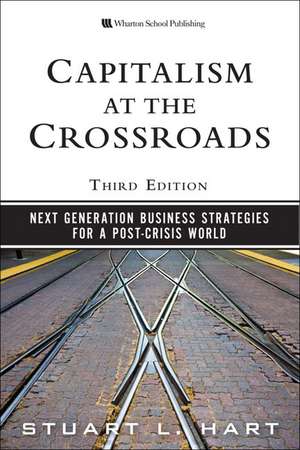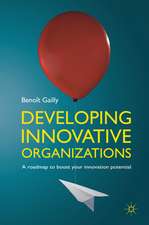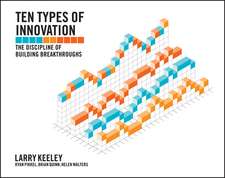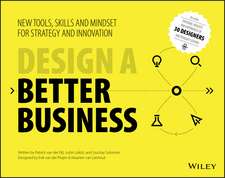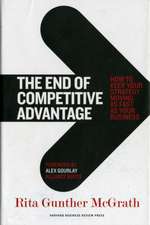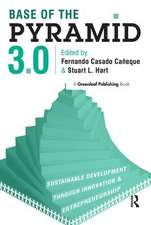Capitalism at the Crossroads
Autor Stuart L. Harten Limba Engleză Paperback – 31 iul 2010
- Thoroughly updated case studies and examples
- Extensive coverage of incubating clean, green technologies at the "base of the pyramid" and "trickling them up" to the top
- A new Preface demonstrating how recent economic crises stem from unsustainable policies and strategies and what can be done about it
- New analyses of oil price spikes and the sub-prime crisis through the lens of sustainable capitalism
- Updates on breakthrough "bottom of the pyramid" initiatives in the U.S. and beyond
Preț: 156.21 lei
Nou
Puncte Express: 234
Preț estimativ în valută:
29.90€ • 32.49$ • 25.13£
29.90€ • 32.49$ • 25.13£
Carte disponibilă
Livrare economică 31 martie-14 aprilie
Livrare express 15-21 martie pentru 27.73 lei
Preluare comenzi: 021 569.72.76
Specificații
ISBN-13: 9780137042326
ISBN-10: 0137042329
Pagini: 322
Dimensiuni: 150 x 224 x 25 mm
Greutate: 0.43 kg
Ediția:Nouă
Editura: Wharton School Publishing
Locul publicării:Upper Saddle River, United States
ISBN-10: 0137042329
Pagini: 322
Dimensiuni: 150 x 224 x 25 mm
Greutate: 0.43 kg
Ediția:Nouă
Editura: Wharton School Publishing
Locul publicării:Upper Saddle River, United States
Descriere
“The central message of Stuart Hart’s book is that global business needs to be caring and be committed to preserving the globe’s ecological integrity. The ongoing economic slowdown brought about by rampant capitalism, the lessons from which this new edition of the book factors in, has only served to emphasize the urgency for business to adopt the radical transformation of strategy that Stuart has been advocating.”
–RATAN TATA, Chairman, Tata Group
“A few books change the way you think. Very few change the way you act. Stuart Hart’s writings have served as a practical guide, a system of road signs that put new order into the complex business of becoming sustainable. We’re learning that we can advance in a meaningful, exciting, and beneficial way. We fully expect that his ideas are guideposts that will mark Dow Corning’s road to sustainability leadership.”
–STEPHANIE BURNS, Ph.D., Chairman, CEO, and President, Dow Corning Corporation
“Capitalism at the Crossroads rightly points to capitalism as the most powerful and creative force we have for solving global problems. It is a welcome antidote to widespread ignorance about capitalism as a force for good.”
–JOHN MACKEY, CEO, Whole Foods Market, and coauthor, Be the Solution
“I hope this book will be able to influence the thought processes of corporations and motivate them to adapt to forthcoming business realities for the sake of their own long-term existence. Besides business leaders, this is a thought-provoking book for the readers who are looking for solutions to capitalism’s problems.”
–MUHAMMAD YUNUS, Founder and Managing Director, Grameen Bank, Bangladesh, and 2006 Nobel Peace Prize recipient
“…a pioneering roadmap to responsible corporate growth.”
–CLAYTON CHRISTENSEN, Professor, Harvard Business School, and New York Times best-selling author, The Innovator’s Dilemma
Reinventing Capitalism and Companies for a Radically New World
Today’s era of economic crisis has sent a powerful message: The age of “mercenary” capitalism is ending. We must finally embark on a new age of sustainable, stakeholder-based capitalism. While enlightened executives and policymakers understand the critical need for change, few have tangible plans for making it happen. In Capitalism at the Crossroads, Stuart L. Hart presents new strategies for identifying sustainable products, technologies, and business models that will drive urgently needed growth and help solve social and environmental problems at the same time.
Drawing on his experience consulting with top companies and NGOs worldwide, Hart shows how to craft your optimal sustainability strategy and overcome the limitations of traditional “greening” approaches. In this edition, he presents new and updated case studies from the United States and around the world, demonstrating what’s working and what isn’t. He also guides business leaders in building an organizational “infrastructure for sustainability”--one that can survive budgeting and boardrooms, recharging innovation and growth throughout your enterprise.
Mapping the terrain: where we stand and where to go from here
The new business case for pursuing sustainable capitalism
Beyond “greening”
Implementing sustainability strategies that go far beyond environmental sensitivity
Becoming indigenous: how to build a truly sustainable global enterprise
How to fully embed your enterprise in the local context--and why you should
Robust organizational blueprints for sustaining sustainability
Making long-term sustainability work in a short-term world
–RATAN TATA, Chairman, Tata Group
“A few books change the way you think. Very few change the way you act. Stuart Hart’s writings have served as a practical guide, a system of road signs that put new order into the complex business of becoming sustainable. We’re learning that we can advance in a meaningful, exciting, and beneficial way. We fully expect that his ideas are guideposts that will mark Dow Corning’s road to sustainability leadership.”
–STEPHANIE BURNS, Ph.D., Chairman, CEO, and President, Dow Corning Corporation
“Capitalism at the Crossroads rightly points to capitalism as the most powerful and creative force we have for solving global problems. It is a welcome antidote to widespread ignorance about capitalism as a force for good.”
–JOHN MACKEY, CEO, Whole Foods Market, and coauthor, Be the Solution
“I hope this book will be able to influence the thought processes of corporations and motivate them to adapt to forthcoming business realities for the sake of their own long-term existence. Besides business leaders, this is a thought-provoking book for the readers who are looking for solutions to capitalism’s problems.”
–MUHAMMAD YUNUS, Founder and Managing Director, Grameen Bank, Bangladesh, and 2006 Nobel Peace Prize recipient
“…a pioneering roadmap to responsible corporate growth.”
–CLAYTON CHRISTENSEN, Professor, Harvard Business School, and New York Times best-selling author, The Innovator’s Dilemma
Reinventing Capitalism and Companies for a Radically New World
Today’s era of economic crisis has sent a powerful message: The age of “mercenary” capitalism is ending. We must finally embark on a new age of sustainable, stakeholder-based capitalism. While enlightened executives and policymakers understand the critical need for change, few have tangible plans for making it happen. In Capitalism at the Crossroads, Stuart L. Hart presents new strategies for identifying sustainable products, technologies, and business models that will drive urgently needed growth and help solve social and environmental problems at the same time.
Drawing on his experience consulting with top companies and NGOs worldwide, Hart shows how to craft your optimal sustainability strategy and overcome the limitations of traditional “greening” approaches. In this edition, he presents new and updated case studies from the United States and around the world, demonstrating what’s working and what isn’t. He also guides business leaders in building an organizational “infrastructure for sustainability”--one that can survive budgeting and boardrooms, recharging innovation and growth throughout your enterprise.
Mapping the terrain: where we stand and where to go from here
The new business case for pursuing sustainable capitalism
Beyond “greening”
Implementing sustainability strategies that go far beyond environmental sensitivity
Becoming indigenous: how to build a truly sustainable global enterprise
How to fully embed your enterprise in the local context--and why you should
Robust organizational blueprints for sustaining sustainability
Making long-term sustainability work in a short-term world
Cuprins
About the Author . . . xi
Acknowledgments . . . xii
Preface: Al Gore, Former Vice President of the United States . . . xxiii
Foreword: Fisk Johnson, Chairman and CEO, S. C. Johnson & Son, Inc. . . . xxvi
PART ONE: MAPPING THE TERRAIN 1
Prologue: Reinventing Capitalism for the Post-Crisis World . . . 3
The Great Disruption . . . 4
The Best of Times, The Worst of Times . . . 5
Environmental Meltdown? . . . 8
The Demise of Development . . . 10
Implications for Corporations . . . 13
The Fork in the Road . . . 15
Chapter 1: From Obligation to Opportunity . . . 19
The Great Trade-Off Illusion . . . 21
The Greening Revolution . . . 23
Shattering the Trade-Off Myth. . . . 25
Breaking Free of Command-and-Control . . . 26
Beyond Greening . . . 30
Raging Against the Machine . . . 33
Smart Mobs Versus Smart Globalization . . . 35
Becoming Indigenous . . . 38
The Road Ahead . . . 41
Overview of the Book . . . 43
Chapter 2: Worlds in Collision . . . 51
The Three Economies . . . 53
Collision Course . . . 60
New Lenses on the Global Market . . . 62
Developed Markets: Reducing Corporate Footprint . . . 65
Emerging Markets: Avoiding the Collision . . . 68
Traditional Markets: Serving Real Needs . . . 72
The Value Proposition . . . 76
Chapter 3: The Sustainable Value Portfolio . . . 79
Sustainability Buzzwords . . . 80
Elements of Shareholder Value . . . 81
The Buzzword Sort . . . 84
Connecting the Dots: The Sustainable Value Portfolio . . . 87
Charting the Sustainable Value Portfolio . . . 97
The Road to Sustainability . . . 99
Pursuing the White Space. . . . 104
PART TWO: BEYOND GREENING 109
Chapter 4: Clean Technology and Creative Destruction . . . 111
Continuous Improvement Versus Creative Destruction . . . 112
From Textile Dyes to Biomaterials . . . 118
Using Carbon Dioxide to Change the World . . . 120
Developing an Ecomagination . . . 122
Whole-Systems Thinking . . . 124
Reinventing the Wheels . . . 128
Technologies of Liberation . . . 131
Eating Your Own Lunch . . . 133
Chapter 5: Innovation from the Bottom-Up . . . 137
On the Horns of a Dilemma . . . 138
Birth of BoP. . . 139
The Tip of the Iceberg . . . 141
Creative Creation . . . 146
Driving Innovation from the Base of the Pyramid . . . 149
Connecting the World. . . 151
Food, Health, and Hope? . . . 155
Power to the People . . . 158
The Great Convergence . . . 162
A New Development Paradigm . . . 165
Taking the Great Leap . . . 167
Chapter 6: Raising the Base of the Pyramid . . . 171
BoP Pioneers . . . 172
It’s the Business Model, Stupid . . . 173
Assessing Sustainability Impact . . . 189
Village Phones: The Triple Bottom Line . . . 192
The MNC Advantage . . . 196
A Common Cause . . . 197
PART THREE: BECOMING INDIGENOUS 201
Chapter 7: Broadening the Corporate Bandwidth . . . 203
Learning from Ladakh . . . 204
The Post-Development Challenge . . . 207
Radical Transactiveness. . . 211
Fanning Out: Extending the Scope of the Firm . . . 213
Fanning In: Integrating Diverse and Disconfirming Information . . . 217
Expanding Our Concept of the Global Economy . . . 222
From Alien to Native . . . 224
Chapter 8: Developing Native Capability . . . 227
Next Generation Strategies and Skills . . . 229
Engage First, Design Second . . . 230
Coinvent Custom Solutions . . . 234
Fail Small, Learn Big . . . 237
Fly Under the Radar . . . 239
Work with Nontraditional Partners . . . 242
Build Social, Not Legal, Contracts . . . 244
Moving Beyond the Multinational Model . . . 248
Chapter 9: Re-Embedding Innovation Strategy . . . 253
Comparing Apples and Oranges . . . 254
Toward a Base of the Pyramid Protocol . . . 257
Learning by Doing . . . 262
Taking the Initiative on Water . . . 267
The Three Big Challenges . . . 273
Leading the Next Great Transformation . . . 276
Chapter 10: Building the Sustainable Global Enterprise . . . 281
Making It Happen in the Real World . . . 283
Aligning the Organization . . . 293
Building the Cathedral . . . 300
Postscript . . . 302
Epilogue: Looking Forward . . . 307
Draining the Swamp . . . 308
The Next Tsunami . . . 310
Who Will Be the Twenty-First Century Watchdog? . . . 312
Index . . . 315
Acknowledgments . . . xii
Preface: Al Gore, Former Vice President of the United States . . . xxiii
Foreword: Fisk Johnson, Chairman and CEO, S. C. Johnson & Son, Inc. . . . xxvi
PART ONE: MAPPING THE TERRAIN 1
Prologue: Reinventing Capitalism for the Post-Crisis World . . . 3
The Great Disruption . . . 4
The Best of Times, The Worst of Times . . . 5
Environmental Meltdown? . . . 8
The Demise of Development . . . 10
Implications for Corporations . . . 13
The Fork in the Road . . . 15
Chapter 1: From Obligation to Opportunity . . . 19
The Great Trade-Off Illusion . . . 21
The Greening Revolution . . . 23
Shattering the Trade-Off Myth. . . . 25
Breaking Free of Command-and-Control . . . 26
Beyond Greening . . . 30
Raging Against the Machine . . . 33
Smart Mobs Versus Smart Globalization . . . 35
Becoming Indigenous . . . 38
The Road Ahead . . . 41
Overview of the Book . . . 43
Chapter 2: Worlds in Collision . . . 51
The Three Economies . . . 53
Collision Course . . . 60
New Lenses on the Global Market . . . 62
Developed Markets: Reducing Corporate Footprint . . . 65
Emerging Markets: Avoiding the Collision . . . 68
Traditional Markets: Serving Real Needs . . . 72
The Value Proposition . . . 76
Chapter 3: The Sustainable Value Portfolio . . . 79
Sustainability Buzzwords . . . 80
Elements of Shareholder Value . . . 81
The Buzzword Sort . . . 84
Connecting the Dots: The Sustainable Value Portfolio . . . 87
Charting the Sustainable Value Portfolio . . . 97
The Road to Sustainability . . . 99
Pursuing the White Space. . . . 104
PART TWO: BEYOND GREENING 109
Chapter 4: Clean Technology and Creative Destruction . . . 111
Continuous Improvement Versus Creative Destruction . . . 112
From Textile Dyes to Biomaterials . . . 118
Using Carbon Dioxide to Change the World . . . 120
Developing an Ecomagination . . . 122
Whole-Systems Thinking . . . 124
Reinventing the Wheels . . . 128
Technologies of Liberation . . . 131
Eating Your Own Lunch . . . 133
Chapter 5: Innovation from the Bottom-Up . . . 137
On the Horns of a Dilemma . . . 138
Birth of BoP. . . 139
The Tip of the Iceberg . . . 141
Creative Creation . . . 146
Driving Innovation from the Base of the Pyramid . . . 149
Connecting the World. . . 151
Food, Health, and Hope? . . . 155
Power to the People . . . 158
The Great Convergence . . . 162
A New Development Paradigm . . . 165
Taking the Great Leap . . . 167
Chapter 6: Raising the Base of the Pyramid . . . 171
BoP Pioneers . . . 172
It’s the Business Model, Stupid . . . 173
Assessing Sustainability Impact . . . 189
Village Phones: The Triple Bottom Line . . . 192
The MNC Advantage . . . 196
A Common Cause . . . 197
PART THREE: BECOMING INDIGENOUS 201
Chapter 7: Broadening the Corporate Bandwidth . . . 203
Learning from Ladakh . . . 204
The Post-Development Challenge . . . 207
Radical Transactiveness. . . 211
Fanning Out: Extending the Scope of the Firm . . . 213
Fanning In: Integrating Diverse and Disconfirming Information . . . 217
Expanding Our Concept of the Global Economy . . . 222
From Alien to Native . . . 224
Chapter 8: Developing Native Capability . . . 227
Next Generation Strategies and Skills . . . 229
Engage First, Design Second . . . 230
Coinvent Custom Solutions . . . 234
Fail Small, Learn Big . . . 237
Fly Under the Radar . . . 239
Work with Nontraditional Partners . . . 242
Build Social, Not Legal, Contracts . . . 244
Moving Beyond the Multinational Model . . . 248
Chapter 9: Re-Embedding Innovation Strategy . . . 253
Comparing Apples and Oranges . . . 254
Toward a Base of the Pyramid Protocol . . . 257
Learning by Doing . . . 262
Taking the Initiative on Water . . . 267
The Three Big Challenges . . . 273
Leading the Next Great Transformation . . . 276
Chapter 10: Building the Sustainable Global Enterprise . . . 281
Making It Happen in the Real World . . . 283
Aligning the Organization . . . 293
Building the Cathedral . . . 300
Postscript . . . 302
Epilogue: Looking Forward . . . 307
Draining the Swamp . . . 308
The Next Tsunami . . . 310
Who Will Be the Twenty-First Century Watchdog? . . . 312
Index . . . 315
Recenzii
Notă biografică
Stuart L. Hart is one of the world’s top authorities on the implications of sustainable development and environment for business strategy. He is currently the Samuel C. Johnson Chair in Sustainable Global Enterprise and Professor of Management at Cornell’s Johnson Graduate School of Management. He also serves as Distinguished Fellow at the William Davidson Institute (University of Michigan) and President of Enterprise for a Sustainable World. Previously, he taught strategic management and founded both the Center for Sustainable Enterprise (CSE) at the University of North Carolina’s Kenan-Flagler Business School and the Corporate Environmental Management Program (now the Erb Institute Dual Master’s Program) at the University of Michigan.
Hart’s consulting clients range from DuPont and SC Johnson to Unilever and General Electric. He is an internationally recognized speaker and has delivered hundreds of keynote addresses on the topic of sustainable business around the world.
He wrote the seminal article “Beyond Greening: Strategies for a Sustainable World,” which won the McKinsey Award for Best Article in Harvard Business Review in 1997 and helped launch the movement for corporate sustainability. With C.K. Prahalad, he also wrote the groundbreaking 2002 article, “The Fortune at the Bottom of the Pyramid,” which provided the first articulation of how business could profitably serve the needs of the four billion poor in the developing world. He invites readers to email him at slh55@cornell.edu and to visit his website at www.stuartlhart.com.
Hart’s consulting clients range from DuPont and SC Johnson to Unilever and General Electric. He is an internationally recognized speaker and has delivered hundreds of keynote addresses on the topic of sustainable business around the world.
He wrote the seminal article “Beyond Greening: Strategies for a Sustainable World,” which won the McKinsey Award for Best Article in Harvard Business Review in 1997 and helped launch the movement for corporate sustainability. With C.K. Prahalad, he also wrote the groundbreaking 2002 article, “The Fortune at the Bottom of the Pyramid,” which provided the first articulation of how business could profitably serve the needs of the four billion poor in the developing world. He invites readers to email him at slh55@cornell.edu and to visit his website at www.stuartlhart.com.
Caracteristici
Shows how environmental and recent economic crises have stemmed from failed corporate strategies and provides specific global solutions.
- Powerful new ways to improve business growth while also improving the quality of life.
- Discusses the oil price spike, the world food shortage, and the sub-prime crisis as failed business strategies and provides detailed solutions.
- New discussions of The Water Initiative (a start up company in Mexico focused on the underserved); and Enterprising Health (a similar US based project).
Caracteristici noi
This edition contains:
- Thoroughly updated case studies and examples
- Extensive coverage of incubating clean, green technologies at the "base of the pyramid" and "trickling them up" to the top
- A new Preface demonstrating how recent economic crises stem from unsustainable policies and strategies and what can be done about it
- New analyses of oil price spikes and the sub-prime crisis through the lens of sustainable capitalism
- Updates on breakthrough "bottom of the pyramid" initiatives in the U.S. and beyond
Textul de pe ultima copertă
"The central message of Stuart Hart's book is that global business needs to be caring and be committed to preserving the globe's ecological integrity. The ongoing economic slowdown brought about by rampant capitalism, the lessons from which this new edition of the book factors in, has only served to emphasize the urgency for business to adopt the radical transformation of strategy that Stuart has been advocating."-RATAN TATA, Chairman, Tata Group "A few books change the way you think. Very few change the way you act. Stuart Hart's writings have served as a practical guide, a system of road signs that put new order into the complex business of becoming sustainable. We're learning that we can advance in a meaningful, exciting, and beneficial way. We fully expect that his ideas are guideposts that will mark Dow Corning's road to sustainability leadership."-STEPHANIE BURNS, Ph.D., Chairman, CEO, and President, Dow Corning Corporation ""Capitalism at the Crossroads" rightly points to capitalism as the most powerful and creative force we have for solving global problems. It is a welcome antidote to widespread ignorance about capitalism as a force for good."-JOHN MACKEY, CEO, Whole Foods Market, and coauthor, "Be the Solution" "I hope this book will be able to influence the thought processes of corporations and motivate them to adapt to forthcoming business realities for the sake of their own long-term existence. Besides business leaders, this is a thought-provoking book for the readers who are looking for solutions to capitalism's problems."-MUHAMMAD YUNUS, Founder and Managing Director, Grameen Bank, Bangladesh, and 2006 Nobel Peace Prize recipient ..."a pioneering roadmap to responsible corporate growth."-CLAYTON CHRISTENSEN, Professor, Harvard Business School, and New York Times best-selling author, "The Innovator's Dilemma" Reinventing Capitalism and Companies for a Radically New World Today's era of economic crisis has sent a powerful message: The age of "mercenary" capitalism is ending. We must finally embark on a new age of sustainable, stakeholder-based capitalism. While enlightened executives and policymakers understand the critical need for change, few have tangible plans for making it happen. In "Capitalism at the Crossroads", Stuart L. Hart presents new strategies for identifying sustainable products, technologies, and business models that will drive urgently needed growth and help solve social and environmental problems at the same time. Drawing on his experience consulting with top companies and NGOs worldwide, Hart shows how to craft your optimal sustainability strategy and overcome the limitations of traditional "greening" approaches. In this edition, he presents new and updated case studies from the United States and around the world, demonstrating what's working and what isn't. He also guides business leaders in building an organizational "infrastructure for sustainability"--one that can survive budgeting and boardrooms, recharging innovation and growth throughout your enterprise. Mapping the terrain: where we stand and where to go from hereThe new business case for pursuing sustainable capitalism Beyond "greening"Implementing sustainability strategies that go far beyond environmental sensitivity Becoming indigenous: how to build a truly sustainable global enterpriseHow to fully embed your enterprise in the local context--and why you should Robust organizational blueprints for sustaining sustainability Making long-term sustainability work in a short-term world
